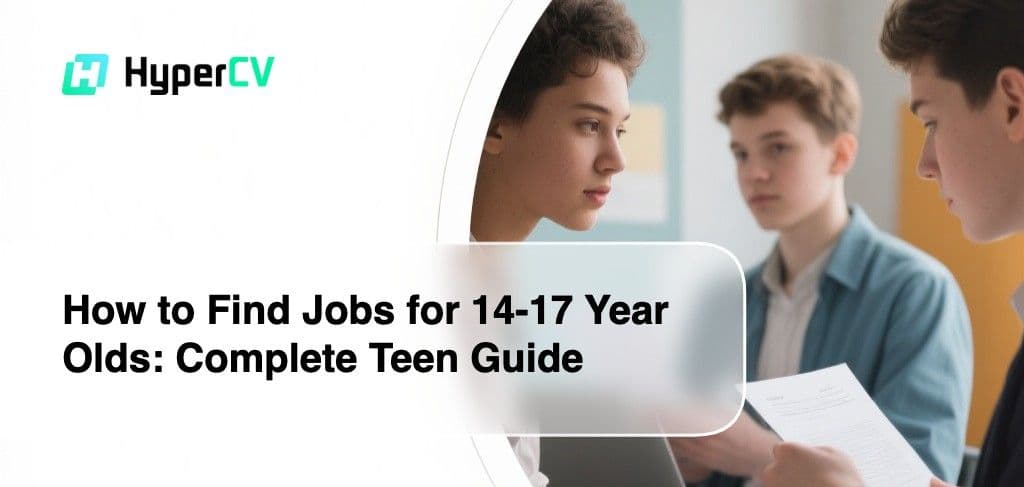How to Find Jobs for 14-17 Year Olds: Complete Teen Guide

Looking for your first job can feel scary, especially when you're just starting out. Many teenagers wonder how to find work that fits their age, schedule, and experience level. The good news is that many companies actively hire young workers between 14 and 17 years old. You just need to know where to look and how to search well.
This guide will walk you through everything you need to know about finding jobs for 14 year olds, jobs for 15 year olds, jobs for 16 year olds, and jobs for 17 year olds. Whether you want part-time work during school or a summer position, these strategies will help you land your first job.
Why Getting a Job as a Teen Matters
Working as a teenager offers many benefits beyond just earning money. You'll develop valuable skills that will help you throughout your career. Here are some key advantages:
- Build work experience early: Starting work young gives you a head start on building your resume
- Learn money management: Having your own income teaches you how to budget and save
- Develop people skills: Most teen jobs involve working with customers or teammates
- Figure out your interests: Different jobs help you discover what you like and don't like
- Gain independence: Having your own money and responsibilities builds confidence
Age Requirements and Legal Rules
Before you start your job search, it's important to understand what jobs you can legally do at your age. Labor laws protect young workers but also create some limits.
Jobs for 14 and 15 Year Olds
At 14 and 15, you can work in many retail and food service jobs, but with rules:
- Maximum 3 hours on school days
- Maximum 18 hours during school weeks
- Cannot work past 7 PM during school year
- Cannot work before 7 AM
- Cannot operate machines or work in dangerous conditions
Jobs for 16 and 17 Year Olds
Once you turn 16, you have more options:
- Can work more hours
- Can work later in the evening
- Can operate some equipment (with proper training)
- More job types become available
Many states require work permits for teens under 18. Check with your school counselor about getting the proper paperwork. The Boston Public Library's Job Help for Teens provides excellent resources on understanding these legal requirements and obtaining work permits.

Best Places to Search for Teen Jobs
Online Job Boards
The internet is your best friend when looking for work. Here are the most effective platforms:
Indeed.com: This is one of the largest job search sites. Use specific search terms like "teen jobs," "part-time," or "no experience required." You can also search by your zip code to find nearby opportunities.
Snagajob.com: This site specializes in hourly and part-time work, making it perfect for teenagers.
LinkedIn: Even as a teen, you can use LinkedIn to find entry-level positions. The platform lists many opportunities suitable for beginners.
Glassdoor: This site not only lists jobs but also provides company reviews, which can help you learn about potential employers.
Company Websites
Many businesses post jobs directly on their websites. Check the "careers" or "jobs" section of companies you're interested in working for. Some popular teen-friendly employers include:
- Fast food restaurants (McDonald's, Subway, Taco Bell)
- Retail stores (Target, Walmart, grocery stores)
- Movie theaters
- Amusement parks and recreation centers
- Ice cream shops and cafes
Walk-In Applications
Some businesses still prefer in-person applications, especially smaller local shops. Put on clean clothes and visit businesses in your area. Ask to speak with a manager about job opportunities.
Local Resources and Programs
Many communities offer special programs for teen employment. According to workforce specialists, local programs like SummerWorks, Artists For Humanity, and community centers often provide job matching services specifically for teens aged 14-17.
Effective Job Search Strategies
Use the Right Search Terms
When searching online, the words you use matter. Try these search phrases:
- "Teen jobs" + your city name
- "Part-time jobs no experience"
- "Summer jobs for teens"
- "Jobs hiring at 14" (or 15, 16, 17)
- "Entry-level positions"
Set Up Job Alerts
Most job sites let you create alerts that email you when new jobs match your criteria. Set up several alerts with different search terms to catch new opportunities quickly.
Apply Early and Often
Don't wait to apply for jobs that interest you. Many teen positions fill quickly, especially summer jobs. Apply as soon as you see a posting that fits.
Network Through Family and Friends
Tell everyone you know that you're looking for work. Parents, relatives, neighbors, and family friends might know of opportunities. Many jobs are never posted online – they're filled through word of mouth.
Top Job Types for Teenagers
| Job Type | Age Range | Skills You'll Learn | Average Hours |
|---|---|---|---|
| Retail/Cashier | 14-17 | Customer service, money handling | 10-20/week |
| Food Service | 14-17 | Teamwork, time management | 15-25/week |
| Babysitting | 14-17 | Responsibility, problem-solving | Flexible |
| Pet Care | 14-17 | Animal care, reliability | Flexible |
| Lawn Care | 14-17 | Physical fitness, attention to detail | Seasonal |
Retail and Sales

Retail jobs are perfect for learning customer service skills. You might work as a sales associate, cashier, or stock person. These jobs teach you how to:
- Handle money and use cash registers
- Deal with different types of customers
- Work as part of a team
- Follow company procedures
Food Service
Restaurants, fast food places, and cafes hire many teenagers. Positions include:
- Cashier or order taker
- Food prep worker
- Server or host (usually 16+)
- Kitchen helper
Food service jobs are fast-paced and teach you to work under pressure.
Recreation and Entertainment
These jobs can be especially fun for teens:
- Movie theater attendant
- Amusement park worker
- Pool lifeguard (requires certification)
- Sports facility helper
- Camp counselor
Personal Services
If you enjoy helping people, consider:
- Babysitting
- Pet sitting or dog walking
- Tutoring younger students
- Lawn care and yard work
Creating Your First Resume
Even without work experience, you can create a strong resume. The Teen Resume Examples & Templates guide shows how successful applicants highlight relevant experience and skills like customer service and teamwork. Focus on:
School Activities
- Sports teams
- Clubs and organizations
- Student government
- Academic achievements
Volunteer Work
- Community service projects
- Religious organization activities
- Helping with school events
Skills You've Developed
- Computer skills
- Languages you speak
- Any special training or certifications
- Leadership experience
Personal Qualities
- Reliable and punctual
- Good with people
- Quick learner
- Hard worker
Keep your resume to one page and use a simple, clean format. Even if many jobs don't require a resume, creating one can help you make a positive first impression on employers.
Acing the Job Interview
Prepare for Common Questions
Most teen job interviews ask similar questions:
- "Why do you want to work here?"
- "What are your strengths?"
- "How would you handle a difficult customer?"
- "What's your availability?"
- "Where do you see yourself in a year?"
Prepare honest, thoughtful answers to these questions.
Dress Well
You don't need a suit, but dress neatly and professionally. Clean clothes, good hygiene, and a positive attitude go a long way.
Show Enthusiasm
Employers want to hire people who are excited about the job. Show genuine interest in the company and the position.
Ask Good Questions
Prepare questions to ask the interviewer:
- "What would a typical day look like?"
- "What training do you provide?"
- "What do you enjoy most about working here?"
Tips for Different Age Groups
For 14-15 Year Olds
At this age, focus on:
- Building basic work skills
- Learning responsibility
- Finding flexible employers who understand school comes first
- Consider seasonal work during summer breaks
Good options include grocery stores, ice cream shops, and family entertainment centers.
For 16-17 Year Olds
With more flexibility in hours and job types, you can:
- Take on more responsibility
- Work in customer-facing roles
- Consider jobs that might lead to career opportunities
- Look for positions that offer skills training
Consider retail management trainee programs, restaurant server positions, or office assistant roles. The HireTeen website specializes in connecting teens with appropriate job opportunities and provides resources on work permits and interview preparation.
Common Mistakes to Avoid
Don't Give Up Too Quickly
Job searching takes time. You might face rejection or not hear back from some applications. This is normal. Keep applying and stay positive.
Don't Lie About Your Age or Experience
Honesty is always the best policy. Employers expect teens to be new to the workforce.
Don't Ignore Work Permit Requirements
Make sure you have all necessary paperwork before starting work.
Don't Take Just Any Job
While you might need to be flexible, avoid jobs that seem unsafe or ask you to do things that make you uncomfortable.
Staying Safe During Your Job Search
Watch for Scams
Be careful of job postings that:
- Ask for money upfront
- Promise unrealistic pay
- Have poor grammar or spelling
- Ask for personal information like Social Security numbers before hiring
- Want to meet in strange locations
Check Employers
Research companies before applying. Look them up online and check their Better Business Bureau rating.
Trust Your Gut
If something feels wrong about a job opportunity, trust your feelings and talk to a parent or counselor.
Making the Most of Your First Job
Once you land a position:
Be Reliable
- Show up on time every day
- Call if you're sick or can't make it
- Follow through on commitments
Learn Everything You Can
- Ask questions when you don't understand something
- Watch how experienced workers handle situations
- Volunteer for new tasks when possible
Build Relationships
- Be friendly with coworkers
- Show respect to supervisors
- Help others when you can
Think About the Future
- Keep track of your accomplishments
- Ask for feedback on your performance
- Consider how this job might lead to future opportunities
Balancing Work and School
Remember that school should always come first. Here's how to manage both:
- Talk with your employer about your school schedule
- Don't take on more hours than you can handle
- Use a calendar to keep track of work shifts and school assignments
- Ask for time off during exam periods
- Consider reducing hours during busy school times
Special Opportunities and Programs
Many communities offer specialized programs for teen workers. Look into:
- Summer youth employment programs
- Internship opportunities through schools
- Volunteer-to-paid position programs
- Local workforce development centers
For those interested in specific industries, some companies offer structured programs. For example, pharmaceutical companies sometimes provide work experience opportunities for older teens, though these are more limited for 14-16 year olds.
Conclusion
Finding jobs for 14 year olds, jobs for 15 year olds, jobs for 16 year olds, and jobs for 17 year olds requires patience, preparation, and persistence. Start by understanding what types of work you can legally do at your age, then use online job boards, company websites, and personal connections to find opportunities.
Remember that your first job is about more than just earning money. It's a chance to develop skills, gain experience, and start building your professional reputation. Take it seriously, work hard, and use it as a stepping stone to future success.
With the right approach and a positive attitude, you'll find a job that fits your needs and helps you grow. Start your search today, and take the first step toward your working future.